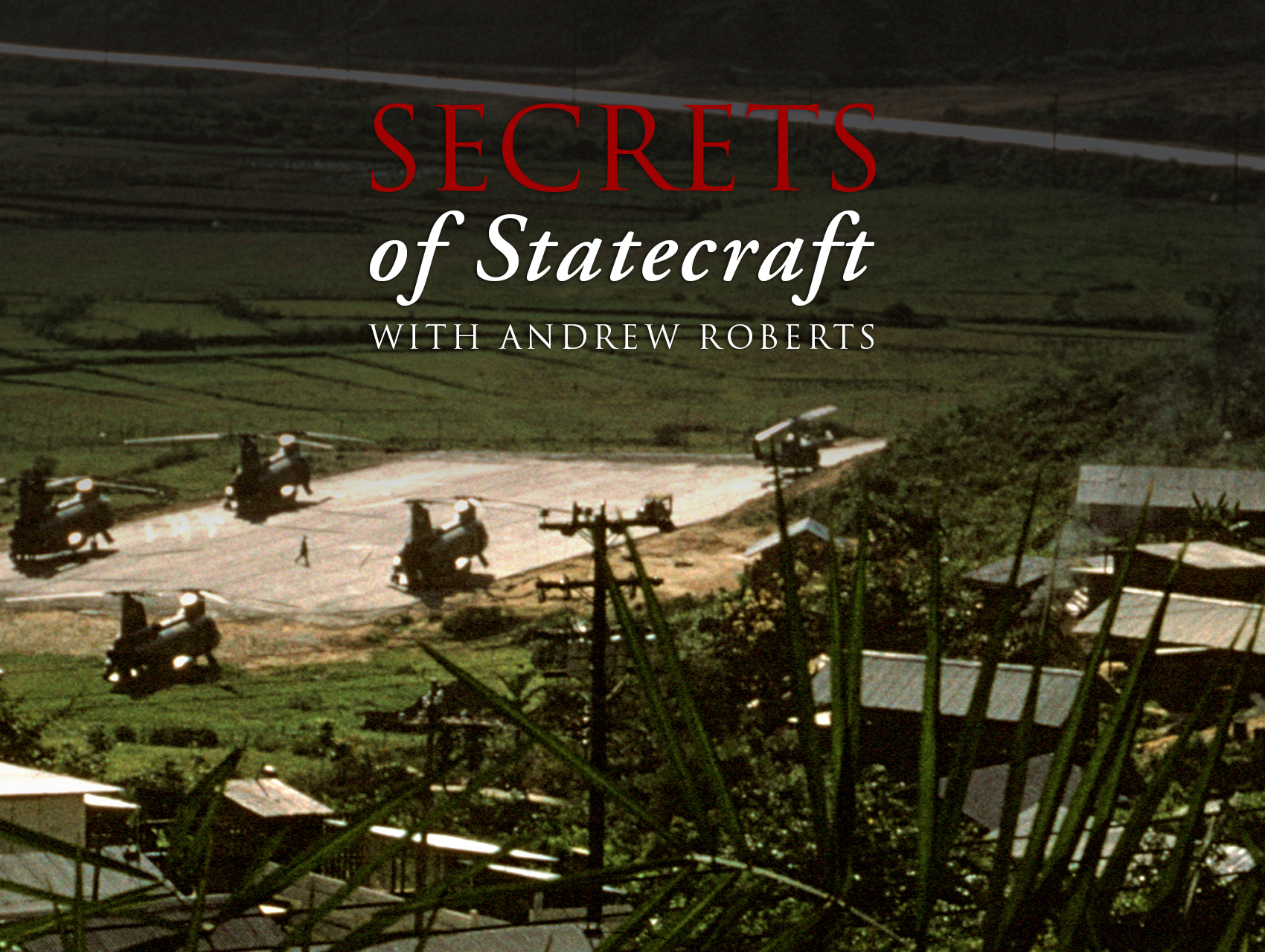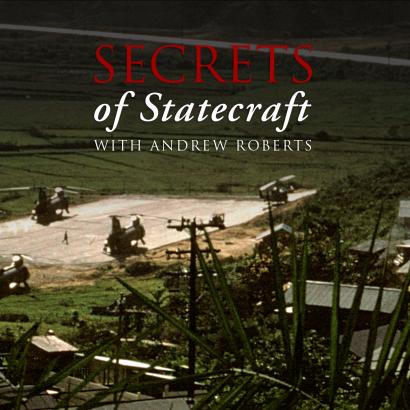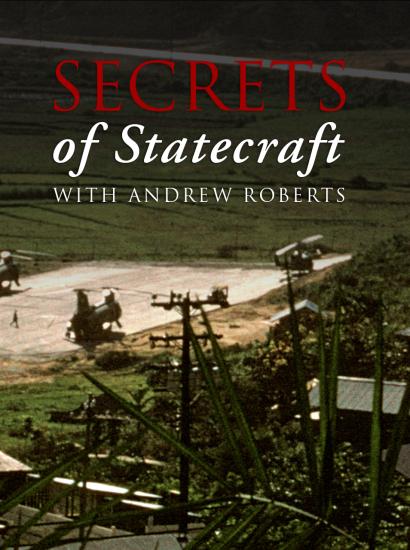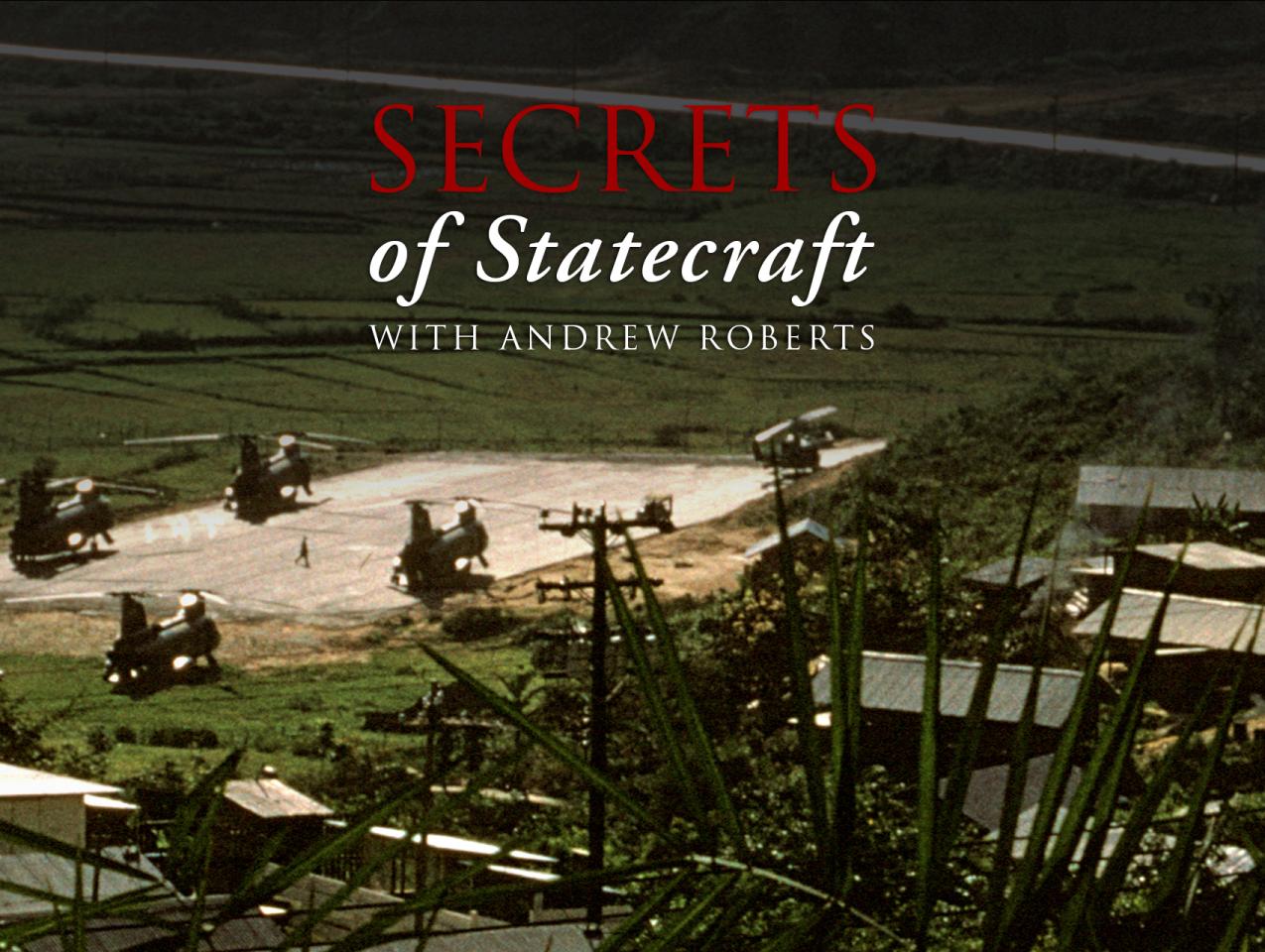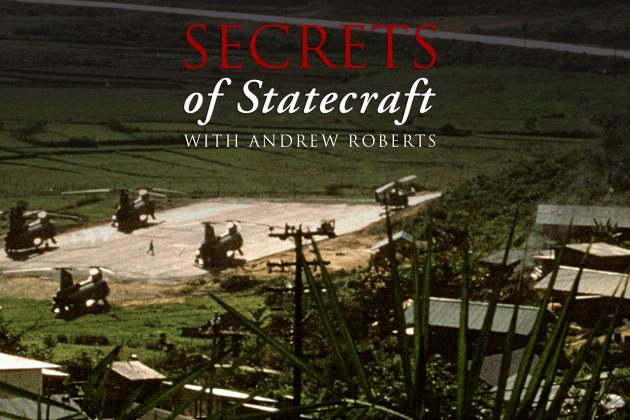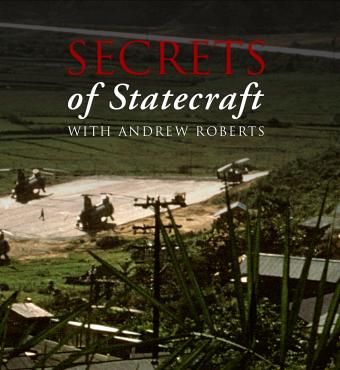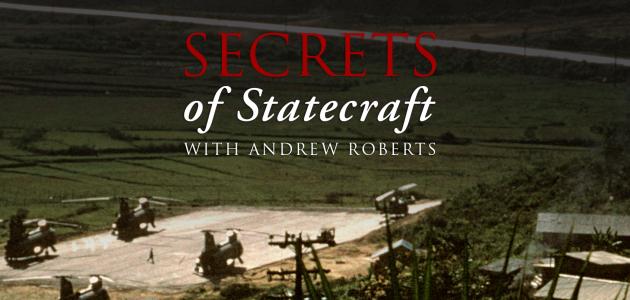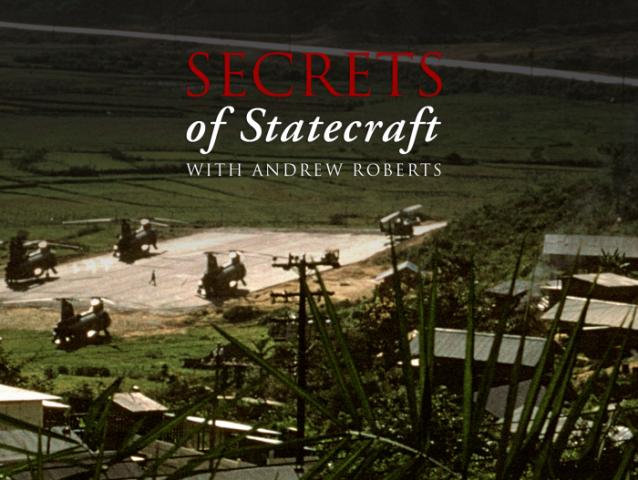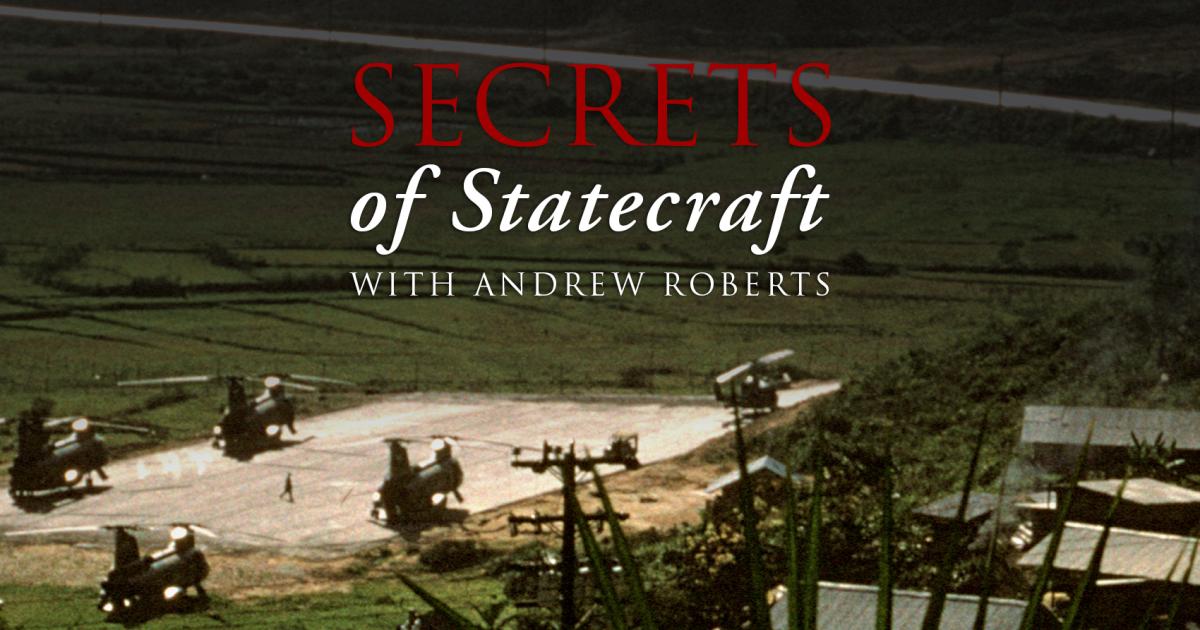Distinguished combat commander Lieutenant General H. R. McMaster speaks about his time as President Trump's National Security Adviser, American mistakes during the Vietnam War, his belief in learning from the past to help to think strategically about the present, and finally he discusses what the Biden Administration is getting wrong and right about the Russo-Ukrainian War.
To view the full transcript of this episode, read below:
Andrew Roberts: HR McMaster is a retired US Army Lieutenant General who served as the 25th National Security Advisor from 2017 to 2018. He's also known for his prominent roles in the Gulf War and Operation Desert Storm. He's now a senior fellow at the Hoover Institution. H.R., history and the past have always played an important role in your life as you have a PhD in American History and you've also taught history at West Point. But before we come onto those periods in your life, please tell us who taught you history and where did your interest arrive from?
H.R. McMaster: Andrew, it's so great to be with you. Really it was my mother. My mother was a teacher and a phenomenal teacher. She taught in the school district of Philadelphia for almost 40 years. She cultivated in me a curiosity about history by visiting historical sites, battlefields, and of course, in Philadelphia, the cradle of our republic to Constitutional Hall, which is a great display of historical documents. There's a new museum of the American Revolution there, which would not have been there as I was growing up, but of course Independence Hall and all of the historical sites in Philadelphia, Benjamin Franklin's home. These are areas that kindled my interest in history. Then I read biography voraciously as I still do, especially Andrew Roberts biographies.
Andrew Roberts: No, you're not allowed. We might have to edit that out of the recording actually H.R., but thank you. The PhD thesis that you wrote at University of North Carolina at Chapel Hill was very critical of the American strategy and military leadership during the Vietnam War. It later served as a basis for your book, Dereliction of Duty, which is still read very widely in the US military and beyond. Would you say the major errors made in that war were political or military or both? Your very hard on LBJ, for example, saying that his strategy was built largely on lies. Would you like to expand on that?
H.R. McMaster: Andrew it was both. It was both a political and a military failure. The responsibility was shared by the president and his key civilian and military advisors. The principal failure, I think, was one of character across the board in which Lyndon Johnson viewed Vietnam principally as a danger to his domestic political priorities. What he wanted was a course of action in Vietnam that would allow him to escape a difficult choice between war and disengagement. As a result, the discourse around Vietnam War decision making masked the long term costs and consequences. In essence, we went to war, American has a war in Vietnam without a strategy. Lyndon Johnson, as president, could get the advice he wanted by virtue of the people he appointed, but Robert McNamara, Secretary of Defense and others, determined that what they needed to do was give the president what he wanted in the form of a fundamentally flawed strategy of graduated pressure. The Joint Chiefs of Staff, the military advisors, for their part, they went along because they compromised principle for expediency. They thought if they just got the first bombing runs off, they just got the first troops introduced, they could argue over time for more resolute military action and the amount of force necessary, they thought, to really shift the balance in favor of South Vietnam.
Andrew Roberts: Is there a happier, a counterfactual ending to the Vietnam War? What ought America to have done after the defeat of France in Indochina instead?
H.R. McMaster: I think initially what America did do, which was the approach of helping the South Vietnamese defend themselves, to strengthen the South Vietnamese government. It's important to note that the Eisenhower policy, called Enhanced Plus, to do that was quite successful. But as you know Andrew, "War is a continuous interaction of opposites" to quote Carl von Clausewitz. That includes the interaction of you and your allies and partners with determined enemies. In 1959, while Ho Chi Minh was the man of the year on Time Magazine because he had been so successful in South Vietnam, that's the same year of a Communist Party plenum in which Ho Chi Minh having consolidated power in the north turned his gaze to the south and began to intensify his support for Vietnamese communists. That's when the South Vietnamese government and armed forces began to lose ground. It's then, I think, when the US response was inadequate because the US response did not place politics and the legitimacy of the South Vietnamese government as the foundation for a comprehensive strategy. Instead they focused on military activity and confused that activity with progress, and President Kennedy made a very poor decision by not stopping a military coup against Ho Chi Minh in November of 1963. A coup that occurred just two weeks before Kennedy's assassination.
Andrew Roberts: After your tremendously distinguished service in the Gulf War, you taught military history at West Point from 1994 to 1996. What periods of history did you teach there and what do you think your students took away? What do you hope your students took away from your classes?
H.R. McMaster: Andrew, it's a survey course. It was a two semester course. We jokingly refer to it as from Plato to NATO. It's a very broad range. I tried to teach the course in the way that Sir Michael Howard, the great historian, military historian, suggested that we all ought to study history broadly, but military history in particular in width, depth and in context. In width to identify changes and continuities over time. In depth to expose the complex causality of events and in particular the human factors and psychological and emotional factors which are quite important to understanding battles and campaigns and wars. Then in context, in context of the political systems of the countries that are waging war, the popular will. So I think that's what we did at West Point. I think, as you know, with any broad course like that, what you're doing is hoping that you kindle in those students an intellectual curiosity about history. That they'll become lifelong learners of history. Maybe they'll learn to ask the right questions and to be sensitive, for example, to both continuity as well as change.
Andrew Roberts: Have you seen that in your students? Have you watched their careers since and seen positive developments?
H.R. McMaster:I have. I think what the study of history really helps you do is to learn how to think, how to think about complex problems. We as historians, we start with this, it's all about the question, how to ask those right questions and then how to conduct really multidisciplinary research and then to draw conclusions based on the evidence, rather than, as is too often the case these days, to use some sort of a social science theory and then try to fit a complex situation into a theory which creates a veneer of understanding, a deceptive veneer of understanding.
Andrew Roberts: I'm very pleased to hear that Michael Howard was a major influence on you. I knew him well, and of course, his books are still read in great numbers today.
H.R. McMaster:Absolutely.
Andrew Roberts: He did also have that advantage of having won the Military Cross in Italy in 1944. And having seen the sharp side of military history being made essentially.
H.R. McMaster: Absolutely, and I think he shared this sort of insight with Carl von Clausewitz. He went to war, I think, at the age of 14. I think that what Sir Michael did for us is to help us understand how to ask the right questions. Then instead of trying to reach just general conclusions, to write from the evidence. You see this from his study of the Franco-Prussian War to even the more broader works of war, such as war in European history. But the essay that I think maybe your listeners would benefit from reading is the Use and Abuse of Military History, which is the essay in which he talks about how to study history and the mistakes that militaries make in peace time, forgetting what they're for and neglecting the continuities in the nature of war.
Andrew Roberts: In 2002 as commander of the first squadron of the Fourth Cavalry Regiment, you were taken on a staff ride by a friend of mine, Peter Caddick–Adams, following in the tank tracks of Guderian and Rommel in their blitz screen to the attack of 1940. Peter believes that the nature of warfare hasn't fundamentally changed just its tools. How far would you go along with that? Do you find staff rides helpful, for example?
H.R. McMaster: Extremely helpful, and the reason is because I do think that wars still resemble each other again to quote Sir Michael again, more than they resemble any other human activity. That's because of, I think, four fundamental continuities in the nature of war. War's political. Of course everybody knows that. Carl Von Clausewitz said that. But what it means is you have to wage war in a way that allows you to consolidate gains and get to the sustainable political outcome consistent with what brought you into the war to begin with. Second, war is human. People fight for the same reasons [inaudible] identified 2,500 years ago: fear, honor, and interest. During a staff ride, you can see how emotion and fear and sense of honor helped determine the outcome. The third is that war's uncertain because of this continuous interaction of opposites between your forces and those of the enemy. This is what allows you to gain the initiative to gain a temporal advantage, an advantage associated with surprise. This is the story of the campaign in 1940 and the collapse of France within six weeks. Then war's a contest of will. I'm thinking of the book Strange Defeat by Mark Block, in which he describes the lack of French will and does an anatomy of what caused the rapid collapse. So I think-
Andrew Roberts: They actually had more tanks, more artillery, more ammunition. Didn't they, when the Germans invaded?
H.R. McMaster: What they didn't have was more confidence. What they didn't have is a clear concept of how they could defend effectively. The French had adopted, by this time, this idea of methodical battle. The commander would be, as they wrote about this in their doctrinal manuals, at the handle of the fan carefully controlling military movements. Whereas the German doctrine, again based on what they learned from World War I. I'll tell you, I think that there's a misunderstanding about military failures early in wars. You know the saying that the military's always ready to fight its last war. I actually believe that militaries who have difficulties early in a war are those who have studied the last or more or recent wars only superficially. It was the German study of their own offensive in 1918, and the failures of it and what more needed to be done to be able to sustain an offensive and introduction of new technology, that allowed them to do that. The radio, the bomber, and the tank. I think that they learned from the last war the right lessons. Whereas the French, that they clung to this idea that the defense was the strongest form of warfare.
Andrew Roberts: Hence The Maginot Line.
H.R. McMaster: The Maginot Line and tanks that can only move at the speed of the boot, for example.
Andrew Roberts: You write, in your book, your 2020 book Battle Grounds, about cavalry using battle drills based on Ernest Harmon and Walt Guderian and Romell were up to. Tell us more about that. It's a very interesting subject.
H.R. McMaster: I think is it's actually an exercise in humility to study history. Those who think that they know everything, all they need is to know their own experience. I think that's quite an arrogant position to take, and in war the stakes are quite high. They're literally life and death. So it's very important to learn from the experiences of others. In this essay that I used in preparation for our battle, our fight in Operation Desert Storm was, I think, kind of a Rosetta Stone for desert warfare. These are General Earnest Harmon's notes on combat actions in Tunisia and North Africa, written to help the armies who were preparing to invade on June 6th, 1944 across the English Channel, to prepare for fighting in the hedge rows and fighting across Europe. They're just brilliant insights that I think were we endeavored to apply to our training and how we prepared for Operation Desert Storm.
Andrew Roberts: You've actually written in your book because the stakes in war involve life and death, as you've just said, combat leaders who choose to learn exclusively from experience are irresponsible. That's pretty tough stance to take.
H.R. McMaster: I absolutely believe it. They're going to always learn new lessons. The character of warfare will change with the introduction of new weapon systems. Sometimes there will be a form of technological surprise or tactical surprise or operational surprise that you have to adapt to. It's not as if history can give you the perfect plans, that the history cannot solve your problems. I like to think of the study of history as Clausewitz thought about the role of military theory. On war he says, it's the formation, the maturing of your own theory of war is like an old professor, the wisdom and old professor imparts to you. The professor doesn't accompany you to the battlefield to solve your problems for you, but or she has equipped you to deal with the complex challenges you're facing.
Andrew Roberts: What do you think the 2014 Russian annexation of Ukraine and attacking the east of that country could be learned from the 1973 Yom Kippur War, for example?
H.R. McMaster: I think quite a bit. I think in 1973 you had the Israeli defense forces, who had a decisive victory in 1967. There's a great long essay, a monograph, the author's name escapes me, entitled The Albatross of Decisive Victory. In it he argues that the Israeli defense force had become complacent in just those six years. At the introduction of some new capabilities into the Egyptian forces, some air defense capabilities along with some anti tank weapons and some qualitative changes in training and leader development and preparation, caught the Israeli's by a surprise. So I think it's very important to learn lessons from the past, but also to anticipate the future. The historian, Carl Becker said it best in a 1938 address that he gave to the American Historical Association, in which he said that memory of past and anticipation of future should walk hand-in-hand in a happy way without one disputing primacy over the other.
Andrew Roberts: The Israelis, although they took a terrible thrashing over the first three to five days of Yom Kippur, after that did come back across the Suez Canal and deal a devastating defeat on the Egyptian army. What's to be learned from that?
H.R. McMaster: I think this has a lot to do with institutional culture. The Israeli defense forces are the defense forces of a democratic nation and meritocratic officer core and the Israelis are not afraid of introspection and learning from failures and adapting quickly. A friend of mine, a doctor of history and a doctor of other disciplines as well, Michael Finkel wrote a great book on this about how organizations, military organizations, recover from technological and tactical surprise. It's called On Adaptability. He has a related book called On Flexibility, and I think it has a lot to do with institutional culture and the willingness to relinquish control and to conduct mission command. At the senior level for commanders, I think what distinguishes an effective senior level commander, maybe more than any other factor, is that he, or she these days, sees opportunities where others only see difficulties. This is the best moment for the counter attack. What Clausewitz called the flashing sword of vengeance, which is the best moment for the defense. You don't identify that opportunity unless you're looking for opportunities, even in the worst of circumstances.
Andrew Roberts: From February 2017 until April 2018, you were the 25th National Security Advisor, which meant you had 24 predecessors to learn from. Tell us a little about the history of the NSA and which advisors, I mean we've mentioned, I think we've mentioned George Bundy already earlier today. Were the best and who were the worst?
H.R. McMaster: Andrew, I think that it's important to note that the National Security Advisor position grew out of just the strategic surprise of Pearl Harbor and the recognition that what was needed in the government in the White House was the ability to coordinate and integrate across the departments and agencies to give the president best analysis, but also to tee up options for the president and assist with the sensible implementation of his policies and decisions. That role grew and changed and morphed based on the personalities of presidents and what they expected from the National Security Council staff and the National Security Advisor. For example, Harry Truman was quite skeptical about it, really didn't pay any attention to the National Security Council staff until the Korean War. Then he met every week and saw the benefit of the need to mobilize all efforts across government in support of the war effort. Eisenhower was very happy with this kind of idea of almost a general staff where he could rely on a staff officer, an extremely talented man named Andrew Goodpaster, to help him in the discharge of his duties and make his decisions. Eisenhower was also quite good at hiding his hand and encouraging debate among his advisors.
Andrew Roberts: He'd been a chief of staff himself, of course.
H.R. McMaster: Absolutely.
Andrew Roberts: That must have helped enormously.
H.R. McMaster: For a very difficult personality named MacArthur.
Andrew Roberts: No one would've wanted that job by dead space. In the conclusion of Battlegrounds, you relate a great story about how your charming son-in-law, Lee Robinson, saw you packing many more books than clothes or indeed anything else as you were going off to become National Security Advisor. You told him that, and I quote, an important first step to developing policy and strategy was to understand how the past produced the present. History for you was an advocation. Would you like to say a few more words about that? I think it's very interesting.
H.R. McMaster: Sure, Andrew. I think it's immensely important to understand how the past produced a present and especially the complex causality, and to recognize that any sort of grounded projection into the near future will be imperfect. And therefore one has to test to prepare for a range of possibilities, maybe even strategic shocks and discontinuities to which one has to react. I'm very much taken by the analysis of Zachary Shore, a great historian, and he's written a couple books I think everybody should read. One of them is called Blunder, Why Smart People Make Bad Decisions. He uses historical examples to show why otherwise smart people made bad decisions. One of the reasons is neglective history, I think. He explains that well, and then in a book called A Sense of the Enemy, he talks about how we can understand patterns of history, but we all also need to learn from pattern breaks and obviously try to anticipate pattern breaks. I think as we're watching Ukrainians suffer tremendously from the renewed invasion of Ukraine that obviously the first invasion of Ukraine was quite predictable based on the pattern breaks of Putin's behavior after he took over in the year 2000. In fact, he telegraphed his moves quite clearly by poisoning a presidential candidate in 2003 and permanently disfiguring him in Ukraine, Tallinn service attacks in Estonia in 2007, the invasion of Georgia in 2008. Just go back to the Munich speech, where you really got, if anybody doubted that he had a worldview that was revanchist.
Andrew Roberts: You could go back earlier than that to show his ruthlessness, the way he treated his sailors on the Kursk, the false flag issues in Chechnya and so on.
H.R. McMaster: And the subsequent mass murders in Grozny.
Andrew Roberts: Absolutely. Absolutely. So from the beginning, we should have spotted that we had an entirely different kind of ruthless leader now in charge of a nuclear armed power.
H.R. McMaster: But three American presidents in a row labored under the delusion, four actually, no three. Maybe President Biden is no longer laboring under delusion, although he did in the beginning. Remember when George W. Bush looked into Putin's soul, and then you had the reset effort under President Obama and him leaning over Medvedev, who was keeping the seat warm for Putin, and saying I'll have more flexibility after the election and maybe just all trade off some air defenses for Poland, in the hope that Putin would become a different person. Then of course, Donald Trump thought that he could change Vladimir Putin. Then President Biden granted a meeting in Helsinki in which he had hoped by explaining what the red lines were, that Vladimir Putin would adhere to those. Of course, all four of those presidents were gravely disappointed.
Andrew Roberts: This podcast, it's entitled Secrets of Statecraft. Are there any insights into the actual daily practice of statecraft at the very highest international level that you gleaned from your 13 months as National Security Advisor?
H.R. McMaster: Andrew, I think those 13 months actually reinforced four fundamental lessons I had learned from reading, researching, and writing about how and why Vietnam became an American War. The first of these that we need to spend a heck of a lot more time thinking about the nature of the challenges and opportunities we face internationally and apply design thinking and problem framing, and again, understanding how the recent past produced the present circumstances. The second, which is immensely important, is to establish goals and objectives, but then also examine assumptions. Oftentimes flawed strategies and policies rest on implicit, and therefore unchallenged, assumptions. The third is to recognize that it's always better to give multiple options. It's important to understand that nobody elected a national security advisor, nobody elected administer of defense or foreign affairs or a Secretary of State or Defense, and therefore you owe it to the elected president to give those multiple options, and in comparing those options, you can draw out potential costs and consequences, relative advantages and disadvantages, the risks associated with it, and maybe potential mitigating actions. Then finally, I think it's important to try to insulate national security decision making, foreign policy decision making from partisan political considerations. Knowing there'll be plenty of people will have a say about partisan political considerations, but if the process is infected by it, like it was in deliberations about Vietnam, you could have the situation, as we did in Vietnam, where there was a sort of contrived consensus around a fundamentally flawed strategy.
Andrew Roberts: You served under a notoriously mercurial, to put it at its kindest, president in Donald Trump. Do you think he understood those four major aspects of your job? Did he appreciate those kind of pressures?
H.R. McMaster: Andrew, I think maybe not fully. President Trump's advantage was his ability to be disruptive because he came really not from a policy background. I think many Americans, who agreed that there was a lot that needed to be disrupted in Washington, those are the people who elected him. But the disadvantage for him was he didn't really understand the roles we were all playing in this sort of Shakespearean drama of the Trump administration. I do think that in the period of time in which I served that he made very sound decisions and we were able to give him real best analysis and multiple options. Now, in the process of doing that, Andrew, I got kind of used up in the job, but I was at peace with that.
Andrew Roberts: You came under sustained assault from Steve Bannon and lots of other people who accused you of all sorts of things that you were very clearly guilty of. It struck me.
H.R. McMaster: No, absolutely, absolutely. The reason for that, Andrew, was I was determined to give the elected president options. There are others in an administration who were there not to do that, but instead to manipulate decisions consistent with their own agendas. Then there's a third group of people that define themselves in the role of saving the country and maybe the world from the president. I think the problem with that second and third group, if the first group is those who want to give the president options, is that nobody elected them. They're actually not only doing the president a disservice, but they're undermining the constitution.
Andrew Roberts: Do you think that, let's just look at those four options in particular in the context of the Biden administration's responsibility for trying to deal with this Russo-Ukrainian war, what are the other assumptions you think that are broadly held in the Biden administration which are incorrect about this situation?
H.R. McMaster: I do potentially, now what I've heard so far has been encouraging. I was disappointed in the initial response to the marshaling of forces on Ukraine's border. That was since August of last year when Vladimir Putin, he published this long essay, 7,000 word essay, in which you argued Ukraine doesn't have a right to exist or really is just another part of Russia.
Andrew Roberts: Actually rather worryingly when you do read it, he also mentions Lithuania no fewer than 17 times.
H.R. McMaster: Absolutely. So I think that's when we should have been flying in all the defensive capabilities. Now we're rushing to get in as the war is ongoing. I think it was a mistake to keep talking about what the heck we weren't going to do. Why does that make sense to talk about that we're not going to deploy our advisors, the evacuation of our embassies, the removal over our vessels from the Black Sea? It seemed almost as if we were inadvertently green lighting the invasion. But since that time, I've been encouraged.
Andrew Roberts: The offer, of course, the offer to fly Zelenskyy out, which he responded to so memorably.
H.R. McMaster: He said, I need ammunition not a ride, or I need weapons, not a ride. I think that now there is an opportunity to improve our strategic competence by learning from those early days. I hope what we've learned is there's no such thing as an off ramp for Putin, Andrew. People who talk about leaving something for him and giving him an off ramp. If we pay attention to history, recent history, we see that an off ramp for Putin is just an opportunity to look for the next on ramp. And so rather than giving an off ramp, I think we should be taping his foot to the pedal and helping him accelerate into the brick wall that he's headed for.
Andrew Roberts: You spoke earlier about giving lots of options to the president. Do you think that the National Security Advisor is giving lots of options to President Biden? And if so, what do you think they are?
H.R. McMaster: Andrew, I don't know. I hope that he is. This is Jake Sullivan, the National Security Advisor. I did put into place a much different process than the process that had been in place under the Obama administration. I do know that my successor, because there were quite a few National Security Advisors under Trump, that he dismantled that and then his successor tried to resurrect it. So I hope that there is a process that involves what we put into place, which was a framing session. We proceeded our discussions about what to do with a session that was aimed at just framing the challenge that we were facing. The first, that was based on a five page paper that had five elements to it, the nature of the problem that we're facing, the inventory of our vital interests that were at stake, the overarching goal and more specific objectives, the assumptions. And then finally what we regarded to be the most significant obstacles to progress and opportunities that we could exploit through the integration of all elements of national power and efforts of like-minded partners. That framing discussion took 30 minutes, Do we agree, disagree, what do we need to change? And then the next 30 minutes for what are your ideas about how to integrate all elements of national power and efforts of like-minded partners to overcome the obstacles and take advantage of the opportunities?
Andrew Roberts: It strikes me that this isn't... I mean that aspect, that approach, isn't just confined or doesn't need to be just confined to grand strategy and military strategy and so on. I mean, business strategy could take advantage of that approach, couldn't it?
H.R. McMaster: Absolutely. What you often see in Washington, instead of this framing and top down guidance from the cabinet, is an exclusively bottom up process that begins with something as simple as Ukraine discuss. Then you get these aimless discussions at various levels, and of course from bottom up you're susceptible to satisficing behavior and lowest common denominator approaches. And what you're left with Andrew, most often, is what I would call policy pablum.
Andrew Roberts: How would you define that? Sorry.
H.R. McMaster: It's just meaningless drivel when you read it. When you read it, you just think, what the hell is the challenge we're trying to overcome? Why do we care? What are our goals and objectives?
Andrew Roberts: You also, when you talked about insulating the foreign policy from partisan political considerations, that does require a kind of bipartisanship, doesn't it? You need one party at least to not take advantage, deliberately not take advantage. Can you see that in modern American politics?
H.R. McMaster: I can, and there are examples of it. I think in particular the shift that we were able to put into place, this is we being those who were serving the Trump administration during that first year of his presidency, which I think the biggest shift in US foreign policy since the end of the Cold War, which is an approach to China that was based on cooperation and engagement to an approach to China based on transparent competition and a recognition that the Chinese Communist party, again, one of these implicit assumptions was not going to, as a prospered, liberalize its economy and liberalize its form of governance.
Andrew Roberts: Which national security advisors of the past do you look up to? Do you think are really impressive people in the jobs they've held?
H.R. McMaster: I'll tell you, I've mentioned Andrew Goodpaster's role in really forming what we understand now as the National Security Council staff. I look at others who were effective, including Henry Kissinger, who was most effective at the relationship between the National Security Advisor and the Secretary of State. But of course, he had the unfair advantage of holding both those positions simultaneously for quite some time.
Andrew Roberts: That would've made your Job a bit easier. Wouldn't it?
H.R. McMaster: It would've been. Of course, how can you not admire Condoleezza Rice and how she responded along with the president's cabinet and his team, President George W. Bush's team to 911, the most devastating terrorist attacks in history. I drew on advice from Henry Kissinger. This is maybe, as my daughters would call, hashtag predictable Andrew for a historian, but I asked the chief of staff as soon as I arrived quite unexpectedly in the White House, the day after I got hired, I started working there and I didn't even live in Washington. I said I would like to, in the next week, speak to every living former National Security Advisor. Which I did, and took notes during in this period of time. Brent Scowcroft is held up quite rightly as the paragon, the example of the honest broker who ran an effective process. I spent an hour and a half with him, and he was very lucid. He was sort beginning to have difficulties physically, but his mind was very sharp. Dr. Kissinger was very helpful to me. He and I spoke many times, but he was in Washington soon after I had arrived. And so in my barren office on day two, I got to sit down with Dr. Kissinger, after which he wrote me a letter, which began with the line. You are walking a tight rope with chasms on both sides.
Andrew Roberts: Just what you want to hear. But equally absolutely right is as was proved. I'm very pleased that you mentioned both of those people actually, because we've had Henry Kissinger on the show and Secretary Rice is going to be coming on in a couple of weeks time. I'm delighted that I managed to have got two of the three best ones of your predecessors. Now, this is a question that I ask everyone who comes on this show. What history book are you reading? Or what book are you reading? I'm hoping it's going to be a history book, needless to say, but what book are you reading at the moment?
H.R. McMaster: 'm reading two books cause I never have only one going at a time. I'm just about to finish How to Be a Dictator by Frank Dakota. And the subtitle is The Code of Personality in the 20th Century. He covers Hitler and Stalin and Kim Il-sung, and Ceaușescu. When you read it, you see sort of the mechanisms in place that people, modern day dictators like Putin Xi Ping, put into place. So it's one of these works of history that illuminates the present.
Andrew Roberts: It got wonderful reviews, certainly. It was really very [inaudible]
H.R. McMaster: It's except exceptionally well done, as are all his books. If anyone has not read the Mao Trilogy those are phenomenal volumes. And he's about to finish a fourth volume that will take the history of the party up to about 2012, I believe.
Andrew Roberts: He was a professor at Hong Kong University.
H.R. McMaster: And still is Andrew. Well, probably in quite a precarious position I would think.
Andrew Roberts: Let's keep our fingers crossed for him there.
H.R. McMaster: The second book, Can I plug another here?
Andrew Roberts: Sure, of course.
H.R. McMaster: Michael Gordon's Degrade and Destroy, which is the inside story of the war against the Islamic state. Michael Gordon is one of these investigative reporters who always takes the first best cut at history. And his previous books on the Gulf War, his two books on Operation Iraqi Freedom, the Iraq War After 2003 are superb. And this is a superb book as well.
Andrew Roberts: The other question I always ask is counterfactual history, what "what-if" moments do you like to look back on and wonder what might have been different?
H.R. McMaster: I know you're nostalgic for the time when the Americas were British colonies.
Andrew Roberts: Isn't everyone?
H.R. McMaster: So I would have to say October of 1777. I know you know why I'm saying this because it's the Battle of Saratoga and the surrender of Burgoyne's army to the continental army, a portion of the continental army who was fighting under Haratio Gates. I think what's important about that, is without that victory, France would not have entered the war. Yes. And I think many Americans-
Andrew Roberts: The French are always there when they need you.
H.R. McMaster: We needed them. We needed them.
Andrew Roberts: Exactly.
H.R. McMaster: And I think most Americans probably don't know that without French support, financial support, as well as naval support and support by the French army, that it's unlikely that we would've been able to win the war.
Andrew Roberts: And because they did, they managed to crush the British in America, which obviously led to two things. First of all, us having to build up a bigger empire elsewhere, often at the disadvantage of the French. And also, the bankruptcy of the Bourbon Court by 1789, which led to their overthrow and Louis the 16th's eventual guillotining. So there is no good deed that goes unpunished.
H.R. McMaster: Well, and then also in the area of contingency what there were others, there were British leaders who were advocating for this reason, to abandon North America early to grant the Americans their independence to focus on the global war against France. Lord Howell for example, was making this argument at the time. I think that Friedrich Wilhelm von Lossberg , who was the Hessian commander in Massachusetts also said it's time to leave. Because he thought that after Saratoga, that the land was too big. There's a long quotation from them. The armies are too large, the land is too large. There's no way that we're going to be able to subjugate the people. And then of course, the British then shift to the southern strategy, which has some initial successes in Georgia, Virginia, South Carolina. But then the tide turns against the British army in the south with a very elusive force that combines militias and regulars. Then that culminates at the battle of Yorktown.
Andrew Roberts: Also, what the happened when the French came into the war, and then the Spanish in 1779 and the Dutch in 1780 against Britain is it turned it into a global conflict where they had to fight in Gibraltar and the West Indies, the channel, there was a serious invasion danger in 1779 and the West Indies. All in all, it completely transformed the war. Haratio Gates, his victory at Saratoga.
H.R. McMaster: Absolutely.
Andrew Roberts: Fantastic. Thank you so much H.R. I've had an absolutely fascinating half-hour or so, and I am sure that our listeners will have too.
H.R. McMaster: Andrew, what a pleasure to be with you. Thank you.
Andrew Roberts: Thank you. Please join me on the next Secrets of Statecraft podcast when I'll be speaking to Professor Steven Kotkin about his life in history and his Pulitzer Prize winning biography of Joseph Stalin.
Speaker 4: This podcast is a production of the Hoover Institution, where we advance ideas that define a free society and improve the human condition. For more information about our work or to listen to more of our podcasts or watch our videos, please visit hoover.org.







